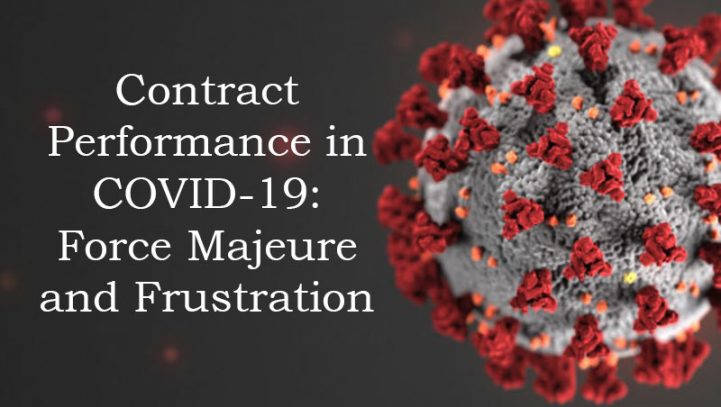Contract Performance in COVID-19: Force Majeure and Frustration
The 28 days lockdown period is only temporary. Serious commercial consequences will follow after this period. Businesses will be facing uphill challenges in fulfilling their contractual duties in a normal way due to the increasing restrictions and limitations imposed by governments around the world.
Examples of questions you may have: –
1. You have less employees working in the manufacturing plant. As a result, you are unable to deliver the orders to your clients on time.
2. A shopping mall has reported COVID-19 cases, the Ministry ordered the closure of the shopping mall for cleaning and sanitisation. You are a tenant in a shopping mall and you are unable to do business for a number of days.
3. You signed a contract to finish a sub-contract job before 1 April 2020. However, you had to be quarantined for 14 days on suspected COVID-19 case.
Thus, it is very important to know how COVID-19 will impact the existing contractual relationships and how you should perform your contractual obligations in this critical time. Let us take a dip into the common FAQs about contract performance during COVID-19. This includes knowing if force majeure clause is applicable in your situation. If force majeure clause is not available, what are the alternatives you can rely on to excuse yourself from performing the contractual obligations.
General
Q: How COVID-19 affected contractual obligations?
A: Travel bans, closure of non-essential businesses, cancellation of public events and other measures imposed by the government and certain private sectors will make it impossible to perform your duty under the contract.
Force Majeure
Q: What is a “force majeure” clause?
A: It is a term in contract that relieves the parties from performing their duties when an extraordinary event that is beyond the control of the parties happened.
Q: What is the effect of “force majeure” clause in a contract?
A: The general effect is that you will be excused from performing your duties in the contract. There are some force majeure clauses that will allow you to perform your duties after the extraordinary event or terminate the contract.
Q: Is COVID-19 considered a “force majeure” event?
A: It depends on the wording of the force majeure clause in your contract. If your contract has terms like “epidemic”, “pandemic”, “disease”, “outbreak”, “government or administrative actions” or a blanket clause that reads as “all events beyond the reasonable control of the parties”, then COVID-19 will likely qualify as a force majeure event.
Q: If COVID-19 is a force majeure event, does that mean I can rely on the force majeure clause?
A: First, you must understand the factual scenario. Every case is different. In general, these are some of the points you need to consider: –
• Does the force majeure clause cover the current event?
• Has that event stopped you from performing your contractual obligations?
• Is there really no other way to perform your duty?
• Can you link between the force majeure event and your duty in the contract?
Q: Is it enough to be a force majeure event if performing the duty in the contract become more difficult or expensive?
A: If the event only makes the performance more expensive or more difficult, it is not enough to trigger the force majeure clause.
Q: What if there is NO force majeure clause, is there anything else to avoid the duty in a contract?
A: You may rely on the doctrine of frustration or impossibility, commercial impracticability or other clauses in the contract that would have affected how you perform your contractual obligations because of COVID-19.
Q: What is a “force majeure” clause?
A: It is a term in contract that relieves the parties from performing their duties when an extraordinary event that is beyond the control of the parties happened.
Q: What is the effect of “force majeure” clause in a contract?
A: The general effect is that you will be excused from performing your duties in the contract. There are some force majeure clauses that will allow you to perform your duties after the extraordinary event or terminate the contract.
Q: Is COVID-19 considered a “force majeure” event?
A: It depends on the wording of the force majeure clause in your contract. If your contract has terms like “epidemic”, “pandemic”, “disease”, “outbreak”, “government or administrative actions” or a blanket clause that reads as “all events beyond the reasonable control of the parties”, then COVID-19 will likely qualify as a force majeure event.
Q: If COVID-19 is a force majeure event, does that mean I can rely on the force majeure clause?
A: First, you must understand the factual scenario. Every case is different. In general, these are some of the points you need to consider: –
• Does the force majeure clause cover the current event?
• Has that event stopped you from performing your contractual obligations?
• Is there really no other way to perform your duty?
• Can you link between the force majeure event and your duty in the contract?
Q: Is it enough to be a force majeure event if performing the duty in the contract become more difficult or expensive?
A: If the event only makes the performance more expensive or more difficult, it is not enough to trigger the force majeure clause.
Q: What if there is NO force majeure clause, is there anything else to avoid the duty in a contract?
A: You may rely on the doctrine of frustration or impossibility, commercial impracticability or other clauses in the contract that would have affected how you perform your contractual obligations because of COVID-19.
Frustration or Impossibility
Q: What is frustration?
A: A supervening act has fundamentally affected the performance of the contract. In Malaysia, the doctrine of frustration is codified in the form of Section 57(2) of the Contracts Act 1950.
Q: When can you say that a contract is frustrated?
A: For you to be discharged from performing the contractual duties in the event of frustration, you must show that: –
1. The parties have never thought of it before and did not put in the contract;
2. The event is not caused by the parties themselves; and
3. The event has made performance of the contract impossible or very different from what the parties wanted at the beginning.
Q: What are the differences between force majeure and frustration?
A: Three main differences. They are: –
1. Frustration is automatic, and you do not need to have an express term for it. For force majeure, you need to have an express term in a contract.
2. The threshold of frustration is much higher than force majeure. For instance, a force majeure event is determined in the contract but an event leading to frustration must be proven to be practically impossible to perform the contract.
3. The remedy could be different. Where the doctrine of frustration applies, the contract will be terminated automatically. For force majeure, it will depend on how the force majeure clause is worded.
Commercial Impracticability
Q: What is commercial impracticability?
A: It occurs when a supervening event changes the fundamental agreement between the parties and it is no longer practical to perform the contract because of excessive costs or extreme difficulties.
Q: Can you raise commercial impracticability to excuse yourself from performing according to the contract?
A: Malaysia court is not ready to accept the broad concept of commercial impracticability, especially the contract has become more expensive or difficult to perform. In other words, the party has to argue the impracticability has made the contract near impossible to perform.
Alternatively, you would have to rely on other clauses in the contract to say that the unexpected events related to COVID-19 have changed the important terms in the contract significantly.
Takeaways
COVID-19 does not only affect the performance of the contract, it also has a significant impact on employment/labour issues, compliance with authorities, shareholders/ directors meetings and etc.
You should be looking into the following: –
1. Conduct reviews – Review your important contracts immediately to identify what you are lacking or needs to be improved in the current situation. If you are unable to perform certain duties, you should keep a record of them.
2. Analyse the issues – Assess what are the potential consequences if you could not perform according to the contract and the applicability of your contract in the coming days.
3. Fix the issues – Take steps to rectify the issues. This includes drafting of new contracts or policies, renegotiating or adding new contractual terms.
4. Mitigate the losses – Check if you can take any steps to mitigate or reduce the losses. If you notice there is a potential dispute from non-performance, notify the other party and sort it out.
5. Be alert – Monitor the updates and announcement by government on regulation, notices and policies. They will have significant impacts on your businesses from time to time.
Remember there is no single answer that can fit all the questions revolving COVID-19. Just like the medical treatment to the novel coronavirus, the legal solutions to combat COVID-19 need to be quick and adaptable for individual cases.
Should you have additional queries relating to performance of contract due to Covid-19, please submit your queries via the following means: –
Covid-19 Employment/Contractual Disputes. Please click HERE
Email: Covid19@LowPartners.com
Covid-19 Legal Hotline: 017 – 490 5293
Related Articles

FAQ for Divorced Spouses and Victims of Domestic Violence
View CN Version As a preventive measure towards the Covid-19 pandemic, our country has since 18 March 2020 implemented the Movement Control Order (“the MCO”). During this period, a lot of divorced or estranged parents...
COVID-19 Impact on Employers
COVID-19 has become a global pandemic. The outbreak of COVID-19 deadly virus is an unfortunate crisis and the situation we are now facing is unprecedented in history. On 16 March 2020, Prime Minister had announced...
Contract Performance in COVID-19: Force Majeure and Frustration
View CN Version The 28 days lockdown period is only temporary. Serious commercial consequences will follow after this period. Businesses will be facing uphill challenges in fulfilling their contractual duties in a normal way due...
行动管制令期间无法营业,公司可否借此为由终止或延长合约
View EN Version 在covid-19心冠肺炎疫情的肆虐下,为了抗疫,我国在三月十八日进入了为期二十八天的行动管制期。在这期间除了特定“重要”领域或行业可以继续运营(受限于对该领域或行业的限制), 所有政府与私人机构必须关闭休业。 抗疫当前,管制令无疑是目前防疫的最佳措施,但这也让很多中小企业正面临严峻的财务危机。在行动管制期间许多中小企业因无法营业而导致无法履行合约的条款或义务,可能因此而面临因违约而被起诉的危机。 那公司可不可以以行动管制令强制停止营业为由,单方面终止或延长合约时间?这就视乎双方可有书面合约(written contract)且合约内容。 1. 书面合约是否有不可抗力 (force majeure) 条款 不可抗力是指一些不能预见,不能避免,不可控制的意外事故。不可抗力条款是一种免责(disclaimer)条款。这条款是规定合约后若须履行职责的一方(当事人),因为不可抗力而不能履行或不能如期履行合约的全部或部分义务,可免除其全部或部分义务或允许延长履行合约时间。 2. 不可抗力条款是否足以概括因covid-19而发生的行动管制令 不可抗力的事故主要包括两种情况,一种是由于自然力量引起的,如水灾、风灾、旱灾、地震等;另一种是社会原因引起的,如战争、封锁、政府禁令等。当事人可不可以利用不可抗力条款,就必须视乎合约内的不可抗力条款是否有概括因疾病而不可控制的情况如行动管制令或封城。 3. 若其条款不足以涵盖covid-19的管制令 若不可抗力条款没有概括因疾病而导致不可控制的事故,如管制令先别慌张,因为合约必须是整体性的。所以法庭在判断此不可抗力条款是否足够概括因covid-19而发生的行动管制令时,也会衡量其他合约的条款和合约的业务性质与业务风险等。 4. 若无不可抗力条款或没有书面合约 那如果合约内没有不可抗力条款或双方并没有书面合约,是否就意味着当事人就完蛋了,必须赔钱了。这也并不一定。法律还是有人性的。 当事人可以提出合约因为管制令的关系无法履行而被迫终止。如同第3段所述,法庭会判断业务性质,因管制令而被迫强制停工或管制令后复工所导致的问题等,合约是否真的已无法进行而被迫终止。 由于因疫情的肆虐而导致行动管制令在我国并没有先例,所以目前并没有案例及确切的情况。以上所述可供指引,若需要深入的法律咨询请填写一下表格,电邮:Covid19@LowPartners.com或拨电至017-490 5293与我们联系。 Covid-19 Legal Help 本文是由我们律师楼的合伙人撰写,卓莉琴律师 Toh Lee Khim Partner, Low...

